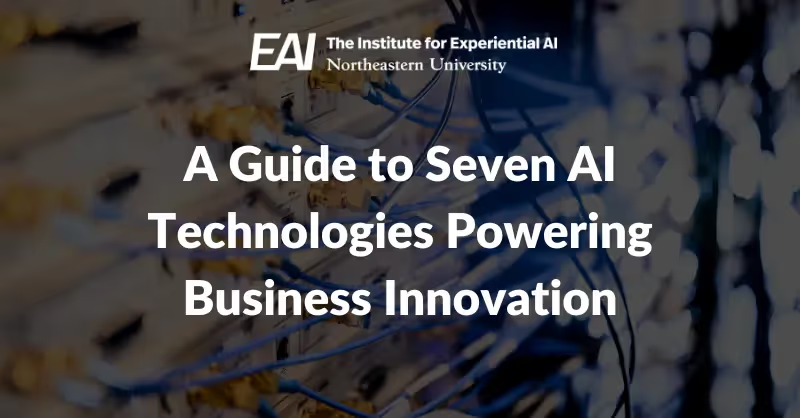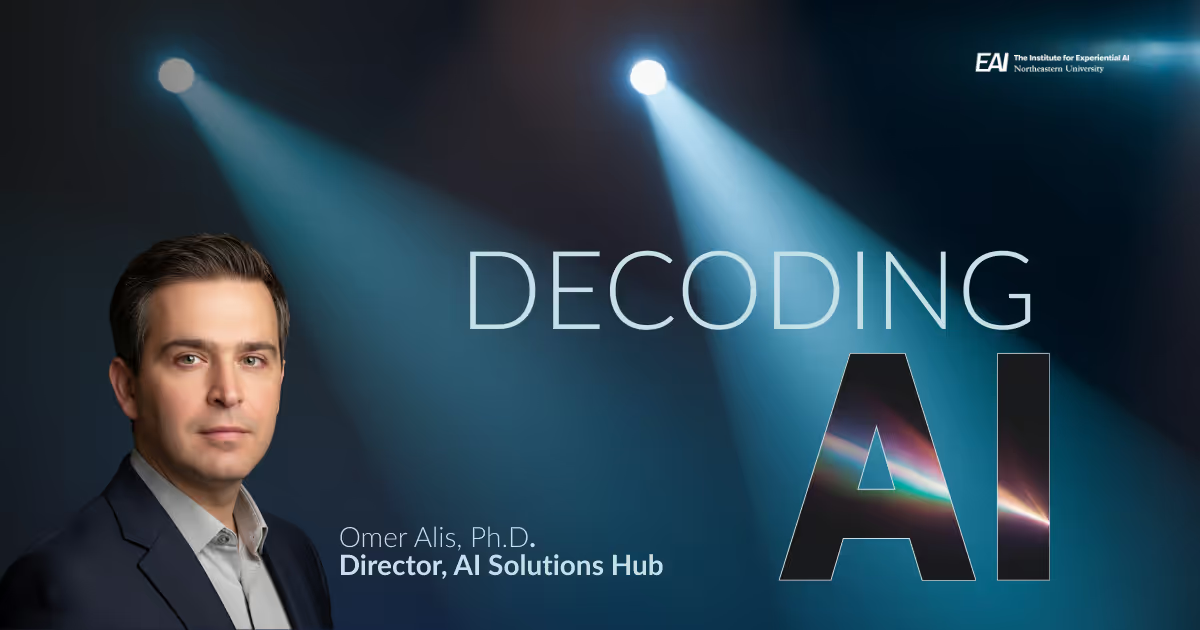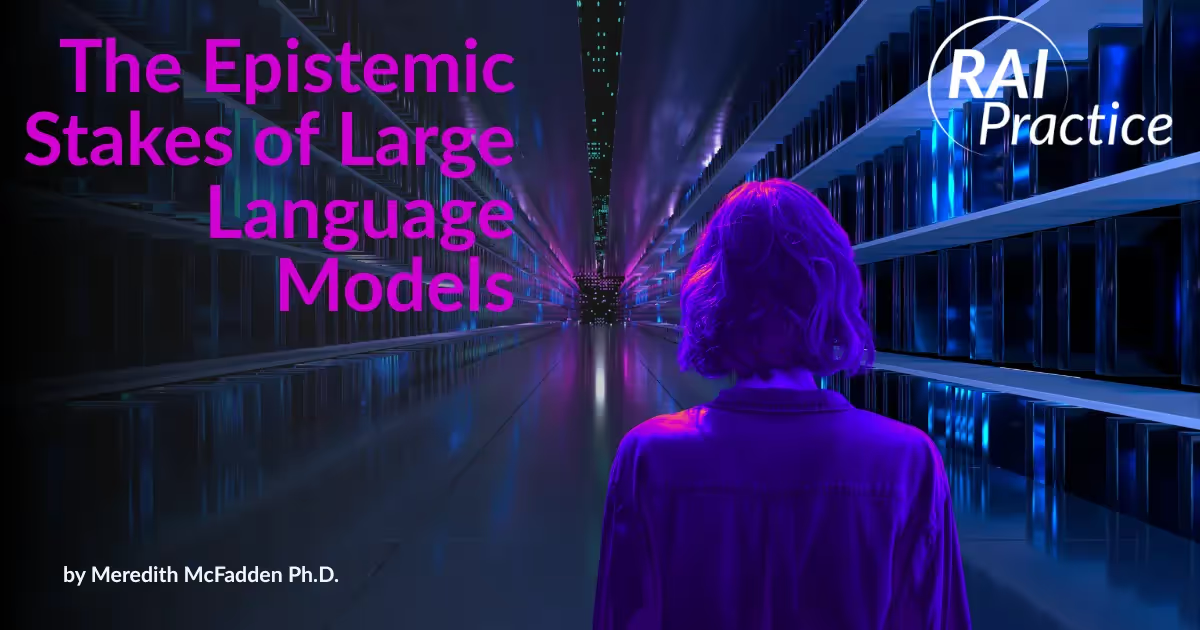Generative AI, Agentic AI, and Large Language Models Explained: A Guide to Seven AI Technologies Powering Business Innovation

Strategically harnessing AI is becoming essential for businesses to stay competitive. But understanding the difference between approaches such as generative AI, agentic AI, and predictive AI is difficult. Leaders at Northeastern University’s Institute for Experiential AI help organizations build AI solutions to solve their specific challenges – not just by deploying AI models, but also by training employees and bolstering their talent pipeline.
Through that work, we field many questions about the different types of AI for companies and how they can fit into business workflows. Below we explain those differences and offer real-world examples of how businesses are using AI today.
What Is AI and Why Does It Matter?
AI refers to a field of technologies that mimic human intelligence, enabling machines to learn, reason, and act independently. For businesses, AI offers transformative capabilities like automating repetitive tasks, generating insights from data, and delivering personalized customer experiences.
The most popular technique within AI is machine learning and within that, deep learning. Deep learning uses neural networks with many layers (hence "deep") to process large datasets and solve complex problems, such as image recognition or summarizing text. Finance companies are using deep learning to detect fraud and conduct risk assessments for loans, while health care organizations are using it to analyze medical images and model molecular drug interactions.

The Most Important AI Approaches for Businesses
Within AI, there are many different approaches that can be tailored to build powerful applications. Below are some of the most impactful for businesses.
1. Generative AI: Creating Content with Machines
Generative AI uses advanced algorithms to create new content, including text, images, videos, and code. Businesses can use gen AI to suggest personalized responses to customer inquiries or to help produce marketing materials, significantly improving the productivity of workers. A retail company might use generative AI to design custom clothing lines based on emerging trends and individual customer preferences, create dynamic and interactive advertising content tailored in real-time, or produce personalized video marketing materials. Walmart is even using generative AI to negotiate deals with suppliers. We’ve built chatbots for banks, health care startups, and a scientific literature search company. Read more about those projects here.
2. Predictive AI: Forecasting the Future
Predictive AI uses historical data to forecast future outcomes, enabling businesses to make more informed decisions about their customers, products, and supply chains. This technology is invaluable for anticipating demand, tracking market trends, and optimizing operations. For instance, Penskey Transportation Solutions is using predictive AI to anticipate maintenance needs before issues arise, helping fleet operators schedule timely repairs and prevent disruptions. We have built models to predict a market research firm’s success as they scope projects; to predict the complexity of claims for a worker’s insurance company; and predictive models to forecast water levels along the coastal United States for an ocean tech startup.
3. Large Language Models (LLMs): Advanced Language Capabilities
Large language models (LLMs) are powerful AI systems trained on vast datasets, capable of handling complex language tasks like answering questions, solving riddles, and writing emails. They can be used to improve customer service, generate comprehensive reports, and summarize extensive documents. A legal firm might employ an LLM to draft contracts, reducing errors and saving time on repetitive work. But human oversight is key. At our institute, we refer to AI with a human in the loop as “experiential AI” and have built chatbots employing LLMs for partners, including a healthcare company that uses it to provide personalized information to patients.

4. Responsible AI: Ensuring Ethical and Compliant AI Use
Responsible AI focuses on the ethical, transparent, and regulatory-compliant use of AI technologies. By integrating fairness and accountability into AI systems, businesses can reduce risks like bias and improve customer trust. A financial institution, for example, can deploy Responsible AI to ensure its credit scoring algorithms are unbiased and explainable, strengthening client relationships. The Institute for Experiential AI regularly helps organizations navigate the various ethical challenges presented by AI technologies with proprietary frameworks, risk audits, training, and more. Check out our Verizon responsible AI case study for a detailed look at our work.
5. Computer Vision: Analyzing Visual Data
Computer vision enables machines to interpret and analyze visual data from images or videos, making it ideal for tasks like quality control, facial recognition, and medical imaging analysis. In industries like manufacturing, computer vision is already integral to automating inspection processes and improving efficiency. We’ve used computer vision to predict the severity of Parkinson’s disease from videos of patients, one of many applications for AI in healthcare.
6. Natural Language Processing (NLP): Understanding Human Language
Natural Language Processing (NLP) allows machines to understand, interpret, and respond to human language, transforming customer communication and internal processes. NLP powers chatbots, automates document analysis, and improves search functionality. In healthcare, NLP helps providers extract meaningful insights from patient records, enhancing care coordination and decision-making. According to one report, the global NLP market in healthcare and the life sciences is projected to grow from $2.7 billion in 2023 to $11.8 billion by 2028.
7. Agentic AI: Autonomous AI Agents for Real-Time Adaptation
Agentic AI represents the next frontier in artificial intelligence, featuring autonomous AI agents that learn and adapt in real time. Unlike traditional AI systems designed for specific tasks, agentic AI can make decisions, execute actions, and optimize processes without continuous human intervention. Think of an AI agent booking you a dinner reservation or changing your account settings. This could enable businesses to swiftly respond to changing conditions and complex scenarios, although we believe hype has led to a lot of confusion among business leaders today. Ultimately executives should focus on the business problems they’re trying to solve with any AI solution. Explore our agentic AI perspective.
Ready to Integrate AI Into Your Business?
The journey to effective, sustainable AI implementation starts with the right partner. The Institute for Experiential AI can build AI solutions tailored to your organization’s needs, whether you’re exploring generative AI, predictive modeling, or Responsible AI frameworks. With expertise and partnerships across industries like healthcare, finance, telecommunications, climate, and manufacturing, we empower you to responsibly harness this powerful suite of technologies.


.avif)

